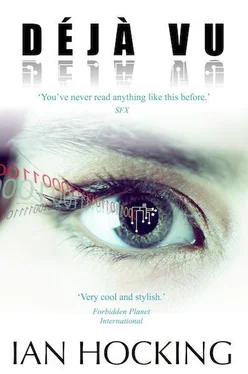When the Visitors returned again to their Leaders, the Leaders nodded in a solemn fashion. ‘You must test some more,’ they said. More Cash was produced.
And so it went on.
A hundred years passed. The number of humans—though they were not truly human, they were just long, long strings of zeroes and ones—increased. They developed a language, and clothing, and built huts, and cooked their food. Some died of a mysterious sickness carried by the air; some were eaten. The Visitors observed. They ticked boxes on questionnaires.
Children were born at a steady rate. But these children were not identical to those in Real World. They were born with two heads, or extra-long tongues, or fluorescent fingernails. Some would never learn to talk. Some were born insane and grew into monsters and were banished.
Still the Visitors ticked the boxes on Their questionnaires. But They were less happy with Their job. It was not because of the Cash. The Cash was good. The Visitors were becoming squeamish. They had seen so much suffering that They began to regard the Onogoro people as Real. It was difficult because They knew that the Onogoroers could never be Real. To be Real, you must be born in Real World. After all, that is what Real means.
But Their doubts remained. They told Their Leaders. Their Leaders nodded solemnly, produced more Cash, and told stories of glory in genetic research: a cure to aging, brain disease and anything wrong with Real people. The Onogoro people would give them the information they needed.
And then, one day, a certain boy was born in Onogoro. He was perfect but in all but one respect. He had no eyes. Now, one of the Visitors, Bruce, was also blind. You might not guess that because this person was very cavalier and helped by His great friend, David. In fact, He had never seen Onogoro. It had only been described to Him. When Bruce learned of the child who had been born without eyes, He returned to Real World and shouted at His Leaders.
They did not nod solemnly. Instead, They told Him He was suffering from stress. They told Him that Onogoro people were not real. How could they be Real, when they were just zeroes and ones? They could not be Real because only people in Real World are Real. After all, that is what Real means.
Bruce talked to His friend, David, until They were both in agreement. They decided that the Onogoroers had been treated unfairly. Bruce and David knew that They should stop interfering with their zeroes and ones, but even if They never came back, other visitors (with their taste for Cash) would continue Their work.
They decided to delete Onogoro.
Their plan was complex and took weeks to prepare. Finally, the day came. The hours ticked by. Three hours before They were due to carry out their plan, a terrible explosion blew through Real World. Onogoro was damaged but it was not deleted. It slept.
When the fires were doused and a new morning came, David and Bruce were summoned to Their Leaders. The Cash stopped. The Leaders wanted to jail Them both.
But David and Bruce were innocent. They went free.
‘And what,’ asked Saskia, ‘do you expect me to make of that?’
‘Same old same old.’ The digital man did not move his eyes from the bonfire. ‘I wish I could see your face.’
‘Allow me to describe it. I am scowling.’
‘Do you understand the lesson?’
‘Yes. You believe that an artificial life form is truly alive and subject to proper ethical considerations. That is untrue. You say this because you yourself are artificial.’
Bruce grabbed his spear and began to stab at the bonfire. ‘Well put,’ he said. ‘But tell me, how long have you had that chip in your brain?’
‘Guess.’
‘I don’t have to. Last week, you told me everything.’
Her smile hung. ‘Last week? Before I -’
‘Let’s start with your body. You are in your late twenties and physically fit. What about your mind? You remember a boyfriend called Simon, but the memory is false. I could tell you more about yourself, but I’ve already reached the extent of your own knowledge. Anything else, you wouldn’t recognise.’
‘Stop this,’ Saskia said. She fought to transform her unease into anger. ‘You have acquired this information from Jennifer, via her father.’
David said, ‘Saskia, you never told me about a boyfriend.’
‘In passing, perhaps I did,’ Saskia replied, but her voice had grown quiet.
‘Describe that chip to me,’ said Bruce.
‘I cannot describe—’
‘Tell me what it does,’ he said. He was still prodding the fire. Unreal embers drifted upwards.
‘It contains a new personality.’
‘How does it contain it?’
‘I…I don’t know,’ Saskia stammered.
‘Let’s think about your mind. Where did it come from? To capture the thoughts of a brain with enough detail to replicate it, the brain must be destroyed. We don’t know whether this brain—what you think of as ‘you’—might have submitted itself voluntarily to the process. It might have been tricked. But I think we must assume that the physical body that once contained what you consider to be ‘you’, Saskia, is dead. I think ‘dead’ is also a good word for the thoughts running on that chip. The code that represents your mind exists, inert, on an artificial substrate, forcing your muscles to move through direct nervous stimulation, just as frog legs will kick when supplied with an electric current.’
‘How do you know all this?’
‘As I said, it was explained to me last week by someone with intimate knowledge of the mechanism: you.’ Before she could interrupt, Bruce continued, ‘Imagine this body we see today, Saskia, lying in an operating theatre, perhaps under sedation, perhaps awake and screaming. A surgeon planted the chip between the cerebellum and the visual cortex. Over the next two or three days, while the body was immobilised, a network of filaments worked into its brain like an aggressive cancer. Each filament grew for a millimetre then divided in two; this happened once every hour, so that within six hours there were more than four hundred million million separate fibres. They formed a three-dimensional mesh. Then the next phase began: the fibres retrained the brain according to the ghost of the mind on the chip. It happened slowly, just as you might rebuild a house by swapping bricks; it takes a while, but avoids having to knock the house down.
‘Imagine your mind as a seesaw with opposing riders. Your chip is light but far from the fulcrum. Your brain is heavy but closer. That’s the way Beckmann likes it. The unconscious speaks through inspiration; through irrational certainty.’
By the pricking of my thumbs.
‘Did Beckmann alter my mind after it was first copied from the…original? I understand guns, violence. Languages.’
‘Those are probably additions. Maybe even fragments of other minds that had those skills. I don’t think it’s possible to fundamentally change the mind itself, in terms of a personality. The construct is too complex. You are the same person you were.’
‘But who am I?’
‘Your mind? We can only guess. As for your body—that is, your brain—it has its own language. You must learn to speak it.’
Saskia stared into the fire with eyes that were not her own and considered Bruce’s words. Beneath the rhetorical flourishes were truths she had already conceived. But the notion of a dividing line between this body and her mind was paradoxical. Was her mind like the flame, and the body like the wood? And yet she could appreciate an essential dichotomy between thinking and doing: her mind was uncontrollable within its own realm, but her body was assured and definite. Her body would move only when her will exceeded a threshold. What did that threshold represent? Was that the line between her mind and her body? Between her identity and her meat?
Читать дальше












